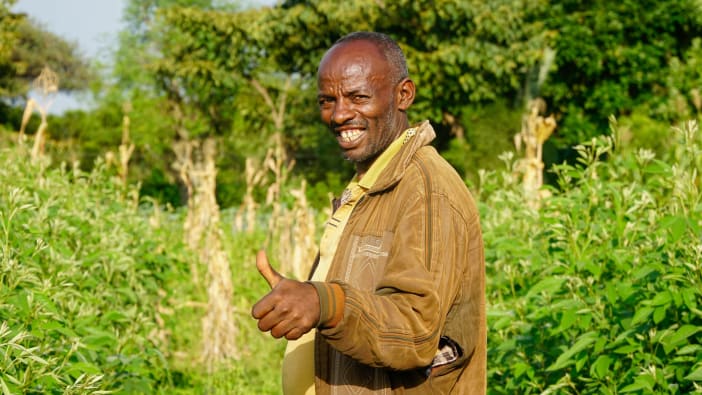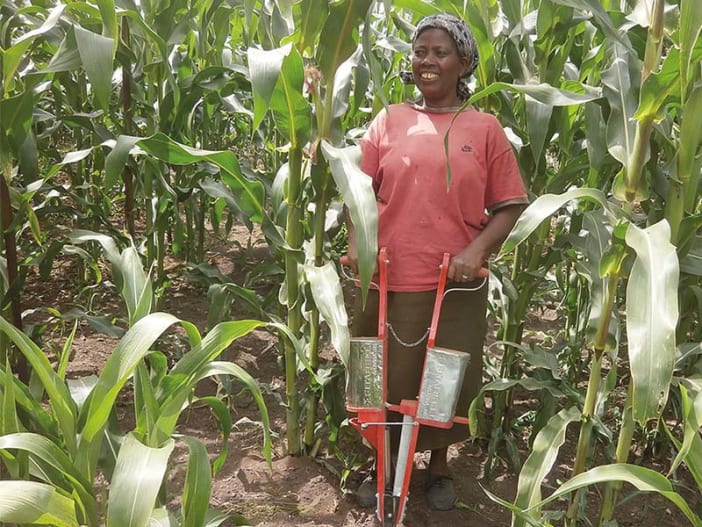by Mike Carter.
Hundreds of books have been written about ‘sustainability’. Perhaps the simplest way of explaining what it means is to look at the word itself. Sustainability is about the ability to sustain. Can whatever it is we are doing, continue in the long term?
The most common definition of sustainable development comes from Our Common Future – the report written by the UN World Commission on Environment and Development: ‘Sustainable development seeks to meet the needs and hopes of the present, without compromising the ability to meet those of the future.’ It may be helpful to think of sustainability in this way…
Sustainability = Production + Continuing resource base
So, for example, sustainable fishing of a lake would involve catching fish (production) without harming the breeding fish stocks in the lake (the resource base). Sustainability involves producing what we need without damaging the resources for production. It means harvesting the fruits of creation in a way that doesn’t reduce creation’s fruitfulness.
Sustainability may refer to a farming system, the harvesting of timber and forest products, how we dispose of human waste, how we operate a healthcare programme or, indeed, how a household or nation’s economy is managed. In each case the question is the same – can we continue what we are doing, in the way we are now doing it, for ever?
A sustainable system is one that can absorb stresses and shocks and yet quickly recovers production when the stress or shock is removed. For example, if coastal rice fields are well protected by mangrove swamps, the shock of severe monsoon floods may cause little long term damage. The rice fields may be covered in sea water, a crop may be lost, but the next crop will yield as before. If, however, the mangrove swamps were removed, the sea water might completely destroy the rice fields – the system would collapse.
Just because a system is sustainable in one area does not mean it will be sustainable in another. Each community, each area, each industry must look with great care at its own methods to decide whether they are sustainable.
Many human activities are not sustainable – during the process of production, the remaining resources are harmed, destroyed or used up. This may be due to ignorance or greed or because people don’t care. This is why environmental education is so important. As Christians, that education needs to be Bible-based, centred on how scripture instructs us to use and care for creation.
Unsustainable systems may be allowed to continue for another reason. For example, we know that the earth holds a limited amount of many resources such as oil, aluminium and tin. If we use these resources, eventually none will be left. But many people argue that these are resources God gave us to use and that before they are all used up, science and technology will invent alternatives. However, this is not good stewardship.
Another problem area comes when working out the real costs of production. For example, is it sustainable for a country to allow soft drinks and beer to be sold in cans? Does the actual price of a drink can include the real costs of producing the aluminium, collecting, disposing of or recycling the used cans? Should society and the environment be left to pay for picking up the mess? Surely, the polluter (the producer company and the consumer of the drink) should pay! If the polluters are forced to pay all the real costs they may well change the method of production and consumption to make it more sustainable.
What are your important environmental issues?
In a recent workshop in Nigeria, participants identified the following as the most important problems in their area in order of priority.
Soil erosion the loss of soil for agriculture by water, wind and human activities. The loss of the top layer of soil also reduces the soil’s ability to soak up rainwater, causing streams, wells and even rivers to dry up.
Desertification Many of the deserts in the world today were once forested or under agriculture. The need to encourage tree planting and introduce agroforestry methods into farming is vital.
Population growth As the world population increases, the pressure on land and resources increases. Whatever progress a country makes in education or agricultural production will have little if any effect on development if the population growth rate continues to rise.
Pollution Industrial gases released from manufacturing may cause respiratory and eye problems, especially in urban areas. The rivers and sea are often used as a huge dumping ground, causing many problems.
Waste disposal All of us produce waste, whether it is simply household waste or waste from manufacturing and industry. The ways in which we dispose of waste are often not sustainable. Individuals, companies and nations alike are all good at putting waste out of sight and forgetting it. However, the effects of poor waste disposal have a habit of catching up with us. Disposing of waste properly needs money and effort. Companies must be forced to dispose of their waste safely and to prevent pollution. Public concern is the most effective pressure. However, the best way of reducing pollution from waste disposal is to reduce – by more efficient use of resources – the amount of waste we produce. Many rich nations especially, are beginning to learn this lesson.
Energy and fuel scarcity The world’s fuel resources – of wood, coal, petrol and gas – are being used up at an alarming rate. In addition, the burning of fuels in factories, vehicles and homes has increased the amount of carbon dioxide in the atmosphere. This acts like a blanket around the earth, causing it to become warmer – the ‘greenhouse effect’. Scientists are only beginning to discover the full implications of this. The earth’s warming could cause the gradual melting of the polar ice caps, a rise in sea levels, changes in crop production, imbalances in insect pests and changes in climate and rainfall patterns.
Mike Carter works in the International Department at Bishop Burton College, Beverley, N Humberside, UK, with experience in Kenya, Papua New Guinea and Nigeria.









